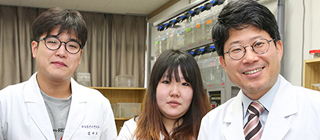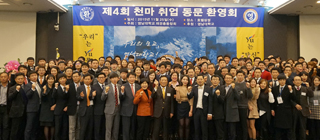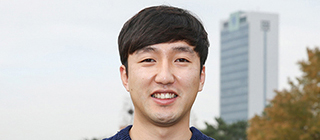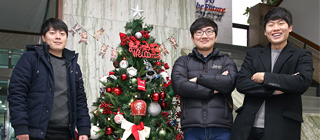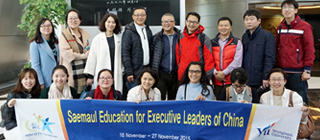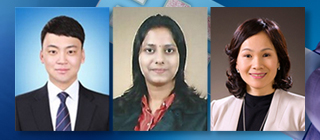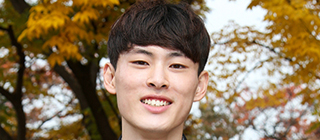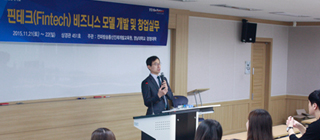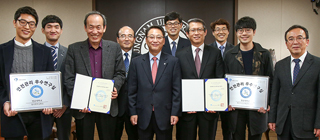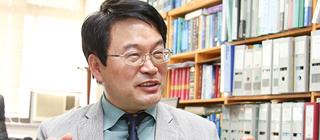-
Revealed mechanism for changes in blood protein and increase in saccharification, as well as skin cell aging promotion mechanism for the first time in the world Research team recommends ‘avoid exposure for diabetic or chronic inflammation patients and pregnant women and young children’ [December 8, 2015] <YU research team that revealed the mechanism that causes toxicity of ultrafine particles for the first time in the world> (from left to right, BK21 Plus Project Team Researchers Kim Jae-yong, Lee Eun-yong, Professor Cho Gyeong-hyeon) A research team at YU made news by becoming the first in the world to reveal the mechanism that causes toxicity of ultrafine particles. Ultrafine particles, which refer to particles having less then 2.5μm (micrometer, 1μm = 1mm/1,000) diameter, is known to heighten risk of atherosclerosis and diabetes, while also being harmful to pregnant women. However, details on the reason for it were unknown. The YU BK21 Plus Project Team (Team Director, School of Biotechnology Professor Cho Gyeong-hyeon) observed the effects of ultrafine particles on blood serum lipoprotein, skin cells and vascular cells, as well as the physiological effects that appear when the embryos of zebrafish are exposed to ultrafine particles. The research team carried out studies by receiving ultrafine particle specimens collected by the Seoul Meteorological Observation Station in January 2014 at the National Institute of Environmental Research Atmospheric Environment Research Bureau, which is a national research institute under the Ministry of Environment. The exposed the research subjects by exposing to ultrafine particles with 3ppm (part per million, 1/1,000,000) and 30ppm, and observed cellular changes after 48 hours. <The research team examines cellular changes caused by ultrafine particles.> The research team revealed that ultrafine particles can cause an increase and transformation of saccharification of lipoproteins, acute cardiovascular toxicity, and skin cell aging. In addition, zebra fish embryos that were exposed to both materials that cause inflammation and ultrafine particles had a 19% increase in spinal development disorders compared to the control group, while the inflammation rate and death rate also increased by 4.3 times and 30%, respectively. In particular, when treating with ultrafine particles together with fructose that causes diabetes and substances that promote inflammation, it was found that risk of transformation of lipoproteins and cardiovascular diseases accelerated even further. The research team said, "Through this study, it was confirmed that even if the ultrafine particle concentration is light, patients with inflammations, chronic diseases such as diabetes, gum diseases, and rheumatism arthritis, and pregnant women had higher risks," and added, "Patients with weak immunity functions, pregnant women, and young children should avoid exposure to fine particles as much as possible." Meanwhile, the results of this study will be published in the December 2015 issue of 'Molecules and Cells', which is an international academic journal.
-
YU Economics and Business Alumni Association holds welcoming ceremony for alumni who gained employment in the Seoul area for the 4th straight year Over 300 participated including senior alumni and new employees Made mentor-mentee relations to continue alumni love [November 26, 2015] <The '4th Cheonma Employment Alumni Welcoming Ceremony' was held at the Samjeong Hotel in Seoul on the 25th.> Power leaders of Korea who graduated from YU gathered to encourage their juniors. The YU General Economics and Business Alumni Association (Chairman Yoon Sang-hyeon) held the 'Cheonma Employment Alumni Welcoming Ceremony' at the Samjeong Hotel in Seoul on the 25th at 7 p.m. The YU General Economics and Business Alumni Association has been holding an annual employment alumni welcoming ceremony since 2012 to encourage juniors who found employment in the Seoul area and just began their professional careers. This was designed by seniors in various fields to show their love and interest to juniors who just began their professional careers, while congratulating fellow alumni who are just beginning their social lives. This welcoming ceremony was attended by over 200 senior YU alumni in political, government, financial, legal and cultural fields such as Jang Moo-ik (82), class of '52 who graduated 57 years ago, YU General Economics and Business Alumni Association Chairman Yoon Sang-hyeon (Business, '69, CEO of Ilshin Electronic Industries and Trading Company), Former Minister of Health and Welfare Jeon Jae-hee (Public Administration, '68), Yuhan Corporation CEO Lee Jung-hee (English and English Literature, '71), Korea Minting and Security Printing Corporation President Kim Hwa-dong (Law, '76), Councilman Joo Ho-young (Law, '78), Former professional baseball player Yang Joon-hyeok (Economics, '88) and Olympic Soccer Team Head Coach Shin Tae-yong (Physical Education, '88) gathered despite their busy schedules to meet their juniors. Including the 100 junior alumni who recently found jobs in the Seoul area, a total of 300 YU alumni gathered together. They greeted each other happily and gave all their advice and encouragement for their professional lives. YU General Economics and Business Alumni Association Chairman Yoon Sang-hyeon (65), who has been in charge of the event for the past four years, said in his welcoming address, "This age needs experts and leaders. I hope you become leaders who are not only talented in your respective fields, but also equipped with strong character and personality." He also stated, "I hope that through this opportunity today, seniors will act as mentors for juniors, and our juniors follow in the footsteps of the seniors who have made their place in society and become a pillar for the development of our society," while adding, "I hope that the juniors attending today will continue the tradition of holding welcoming ceremonies for the next group of alumni who will also begin their professional careers." Attorney Kang Yeon-seob, who graduated from the YU Law School in February and just began his career in law, said, "I am well aware that this is possible through the efforts and passion of my seniors," and added, "We juniors will now follow in the footsteps of our seniors and create a better future." Miss Jung Yoo-jin (23, Architecture, '11) who graduated in February and began employment in the design department of Dawon IDNC, an interior design company in Seoul, represented the new alumni members and stated, "We will become great senior alumni that will take the love that we received from our seniors to lead our juniors with more love." YU President Noh Seok-kyun (6) and Student Body President Kim Su-hyeon (26, Architecture, Senior), who were also present on behalf of the university and students, also expressed their appreciation for the devotion of senior alumni to their juniors. <YU President Noh Seok-kyun and Yuhan Corporation CEO Lee Jung-hee (right, English and English Literature, '71 gives congratulatory addresses> YU President Noh Seok-kyun said, "The isolation and needs you experience when standing alone outside of your family and school as rookies in society will make you wise and brave," and added, "I hope that you will follow in the footsteps of your seniors present here and become leaders of Korea." Student Body President Kim Su-hyeon stated, "I can find a sense of direction and goal by seeing my seniors here as a student," and added, "I am happy to see my seniors trying to lead us. We will also work hard to become a proud part of society by following the lead of our seniors." Short speeches were held by senior alumni at the welcoming ceremony as well. Yuhan Corporation CEO Lee Jung-hee said, "After joining Yuhan Corporation in 1978 and taking Dr. Yoo Il-han as my life mentor, I worked hard and made it to where I am today." He added, "Our junior alumni who just took your first steps in society should also find a life mentor and do all you can, and I assure you, you will be successful." Meanwhile, in the three-hour event, the participants made mentor and mentee agreements and promised to continue their ties. They congratulated the start of new relationships with a toast by Former Minister of Health and Welfare Jeon Jae-hee and promised to meet again in 2016.
-
Proposed ‘Hydrogen Car Hydrogen Storage Compressed Container Performance Improvement Process’ High performance, light weight, various form production possible “Will be applied to future hydrogen cars” [December 9, 2015] Kim Gyeong-deok (26, 2nd term of master's degree program) at the YU Graduate School of Textile Engineering and Technology received the grand prize at the '2015 College (Graduate School) Student Idea Contest'. This contest hosted by the Korea Textile Development Institute was made to be used for the development of the textile industry by finding creative ideas and attracting the interest of college and graduate school students in textile technologies. This year, the contest was on ideas in corporate support capacity improvement sectors such as technological and commercialization support for the activation of the materials and convergence technologies using smart, highly functional and super textiles, while also pioneering markets for the textile industry. After the first document review and second presentation review since accepting ideas in August, Kim Gyeong-deok who proposed the 'Hydrogen Car Hydrogen Storage Compressed Container Performance Improvement Process' won the grand prize. Mr. Kim received a cash prize of 3 million won and will receive the benefit of being exempted from document reviews when applying to the Korea Textile Development Institute for employment. The technology proposed by Kim is an idea to improve the performance of pressure containers that can withstand higher pressures than other products in order to bring about early commercialization of hydrogen fuel cells. Kim said, "Instead of the hydrogen storage pressure container produced with steel and carbon fiber materials, I proposed a new process that can produce container pressures that can withstand much higher pressures than in the past." He added, "When produced with this performance improvement method, it will be possible to make the product light-weight and it will also be possible to freely form the container for efficient use." Hydrogen fuel cell automobiles, which are environment-friendly and cheap, is expected to take up a considerable portion of the future automobile market, so Kim's idea is receiving more attention. Kim says that as a student of textile engineering he is very interested in automobile materials, and stated, "Though hydrogen fuel cell automobiles are not highly commercialized yet, I believe that it will lead the future automobile market. I came up with this idea based on this and I think that it has sufficient market value." He added, "Though it might not be possible to materialize on this idea right now, by enhancing technological perfection when the market becomes bigger and automation is achieved, it will be possible to mount on hydrogen fuel cell automobiles." Meanwhile, the Korea Textile Development Institute is planning to utilize ideas from this contest and conduct R&D using various methods.
-
Proposed idea using public data ‘Auto send in emergencies’ using sensors and GPS in smart phones Help prevent crimes against women and elderly [December 11, 2015] <Students of the Department of Mobile Information and Communication Engineering Team awarded at the 'Idea Contest-Create with Public Data'> (from left to right - Jang Jung-hyeon, Choi Bong-joon, Kim Dong-geun) ) YU (President Noh Seok-kyun) students were awarded at an idea contest recently by proposing a 'crime prevention app' using public data. At the '1st Idea Contest - Create with Public Data in Daegu' held by Daegu City, the 23 year-old trio team 'Superman is Back' of Kim Dong-geun, Jang Jung-hyeon and Choi Bong-joon, all juniors in the Department of Mobile Information and Communication Engineering, took second place. This contest was held to promote public information-based startups through creative ideas using public data and finding new business models. Their idea is receiving high attention since there are many cases in which various public data possessed by the government or public institutes are being used as various items. The 'Superman is Back' team came up with a smart phone app that can promptly react to sudden emergencies through a simple motion or signal sound. When the user faces an emergency, it is possible to quickly make a report using location information of security-related agencies such as police stations using sensors and GPS in smart phones. When the smart phone sensor recognizes shaking or certain sounds, a text message is sent to the police, relevant institutes, or friends and family containing personal information such as location. Jang Jung-hyeon said, "When the user faces an emergency situation in a dark alley or other places without people around to help, it is possible to simultaneously send the current location or user information with a simple hand signal or shouting out a short word," and added, "It is a very simple idea and it can be configured with the current technology." Team leader of 'Superman is Back' Kim Dong-geun said, "It will be useful for women, the elderly, or young children who are relatively more exposed to crime." He added, "It started off with just a small idea, but I hope that it can be commercialized and help prevent crimes in society."
-
Chinese public officials, professors, NGO representatives, Asia Productivity Organization experts from 10 countries, etc trains at YU Study the successful community development cases, field studies of Korea’s development history, etc [November 29, 2015] < Chinese training team poses for a photo after taking a field trip to POSCO. > YU (President Noh Seok-kyun is solidifying its position as a central education and training institute to share the Saemaul Undong and Korea’s development experience. While there is a spreading trend to learn Korean around the world such as in Africa, South America, Southeast Asia and China, Saemaul training teams comprised of leaders from emerging countries are stepping in line to visit YU. The International Development Cooperation Office (Director Choi Wae-chul) carried out a short-term Saemaul Undong training program for 14 leaders from all around China for 12 days from the 16th to the 27th. Members of this group came from not only Beijing, but also Chongqing, Nanjing, Kunming, Tianjin, Guangdong, Jiangsu and Jilin. Members included researchers from the Chinese Social Science Center, college professors, director-level public officials of provinces and regions, and presidents of NGOs. At YU, they learned about the history and achievements of the Saemaul Undong, Korea’s economic development related to the Saemaul Undong, rural and regional development, leadership, health and medical system, afforestation, etc as they became familiar with the success knowhow of Saemaul development in various fields. They also visited POSCO, Samsung Electronics, President Park Chung Hee Restoration Hall in Gumi, Origin of the Saemaul Undong in Cheongdo, Gyeongbuk Techno Park, Gyeongbokgung Palace, Hahoe Village, Byeongsan Seowon, Hanji Experience Center, traditional markets, E-mart, Dongdaemun Design Plaza, Dongdaemun Market, Lotte Department Store, various research institutes, industrial complexes, farms, etc to see with their own eyes the success cases, while also having the opportunity to experience the culture such as watching a Nanta performance. YU International Development Cooperation Office Director (Vice-president) Choi Wae-chul, who oversaw the educational course, said, “Korea and China have been neighbors for millennia and interacted heavily in culture, society and economics, and even today, China is Korea’s biggest economic trading partner.” He added, “For the past 50 years, Korea found the growth engine called the Saemaul Undong with the belief of, ‘Just do it’ and ‘We can do it’ to achieve rapid growth that the international community calls a ‘miracle’. TY is putting forth its efforts to share such experience with the world.” < APO member nation training team visiting Cheongo takes a photo in front of President Park Chung Hee’s statue > Chinese Social Science Center researcher 리렌큉 said, “The YU Saemaul Undong training program is comprised of an excellent curriculum that includes high quality lectures and field lessons. I was able to realize the importance of hard work, self-dependency and cooperation, which is the basic spirit of the Saemaul Undong,” while adding, “In China, there was severe movement of people with the industrialization of the country so rural areas were unable to develop. I believe that Korea’s Saemaul Undong method will be of great help in the revival of rural China.” The president of an NGO from Kunming and a member of the Inner Mongolia Chamber of Commerce from Tianjin also showed great interest in the Saemaul Undong asking if they could send additional people to receive education in the future at their own expense at YU and what kind of educational programs related to the Saemaul Undong are available. In addition, the YU International Development Cooperation Center operated the ‘education program on sustainable regional development and Saemaul Undong’ for public officials and experts of member countries of the Asia Productivity Organization (APO). Eleven public officials and experts in the regional development sector from 10 countries such as Cambodia, Fiji, India, Laos, Mongolia, Nepal, Pakistan, Philippines, Sri Lanka and Vietnam participated. The event started on the 23rd with the orientation and country reports that shared the regional development status and pending issues of participating countries. It was followed by lectures and field work on the history and achievements of the Saemaul Undong, Korea’s rural development policies, water resource management, and afforestation to learn about Korea’s knowhow on successful regional development. This training program that was held for elite working-level public officials and experts in the regional development sector for ten countries in Asia shared the Saemaul Undong, which was the core growth engine for the rapid growth of Korea, and actual experiences related to Korea’s regional development. It is expected that it will provide considerable help for establishing regional development policies and to promote their economies through this for Asian nations in the future. Meanwhile, the YU International Development Cooperation Center, which was established for the purpose of short-term educational programs for leaders of emerging nations in July 2013, has conducted education, lectures and academic conferences on the Saemaul Undong, regional development, and tourism policy development of emerging countries to over 2,000 people from more than 60 countries.
-
Developed new quick diagnosis method of food poisoning bacteria that can be fatal to young children Existing diagnosis method takes 5-7 days, but with new technology, analysis possible in 2 hours and 30 minutes Analyze in just a few hours using inexpensive machine, can be applied to monitoring various food poisoning bacteria [November 25, 2015] < From left to right, Graduate School of Food Science and Food Service Industry, Lee Gi-baek, Professor Shruti Shukla, Professor Kim Myung-hee > A research team from YU is receiving attention from the academic circles by developing a new technology that can diagnose in just a few hours food poisoning bacteria that can result in fatal illnesses by contaminating food for infants and young children. This research was on diagnosing ‘Cronobacter sakazakii), which is a colon bacteria that can result in severe diseases such as meningitis or even death to infants who have weak immune systems by contaminating food or powdered milk for infants. In 2011, a 10-day old died after eating powdered milk in the United States in 2011. Once it was revealed that the child was infected with Cronobacter sakazakii, this pathogenic food poisoning bacteria became a big issue as the cause of infection. The World Health Organization (WHO) designated various Cronobacter bacteria including Cronobacter sakazakii as ‘A-grade pathogens’, which have the highest level of danger, and provides strict safety management guidelines. Therefore, more attention is being placed on these research results. The existing Cronobacter sakazakii diagnosis method has limitations such as requiring prolong periods (5 to 7 days), being labor intensive, and needing expensive analysis devices. However, the newly developed diagnosis technology makes it possible to analyze it in a short period of time with rather inexpensive equipment. The core technology of this study is that the target bacteria in contaminated food is separated using a magnet, and by adding fluorescent materials on the bacteria to obtain signals, it considerably improves the selectiveness, peculiarity, and sensitivity of analysis. Lee Gi-baek (27) who graduated from the YU Graduate School of Food Science and Food Service Industry in February of this year and Professor Shruti Shukla (31) participated in this study as co-primary authors. The results of the study was published in the most recent internet version of <Biosensors & Biolectronics> (Impact factor (IF) 6.409), which is the most authoritative academic journal in the world for the electric chemistry sector, and it is scheduled to also be published in the journal in 2016. School of Food Science and Food Service Professor Kim Myung-hee who participated in this study as a correspondence author said, “With this newly developed system, even a tiny amount of bacteria can be analyzed from as quickly as 2 hours and 30 minutes and no longer than 8 hours,” while adding, “It has the advantage that it can be applied in a broad range for prompt monitoring of various food poisoning bacteria aside from Cronobacter.” This study was carried out as part of the basic research project with the support of the National Research Foundation, and the research team is planning to carry out follow-up research on the automation of the procedures related to food poisoning diagnosis. Professor Kim Myung-hee, who participated as the correspondence author, won a Presidential Citation in July for her contributions in constructing basic data for adding high value to Korean forest resources, improving the functions and safety of traditional fermented foods, and the construction of a safety management basis for agricultural food products.
-
Produced over 100 videos, total views over 6.5 million, comments from over 40 countries Pharmacist from the YU School of Pharmacology, currently working on master’s degree at graduate school Produced videos while preparing for state examination for pharmacist, worldwide issue [November 17, 2015] “I just made the videos for the fun of others and myself. I did not know it would make such an issue!” Koh Toe-gyeong (25) is a ‘Facebook Star’ with 350,000 followers. Koh’s videos on his Facebook account recently reached 1.6 million views and is enjoying celebrity-status popularity. He is receiving a great deal of interest not only in Korea, but also in the US, France, Japan and China. The video that received so much attention is a four minute video that Koh edited from the comic videos that he had been producing in the past. His videos received so much attention that he is even called the ‘Second Psy’ on SNS. What is more amazing is that he is a pharmacist in his 20s who passed his state examination for pharmacists earlier this year. Mr. Koh graduated from the YU School of Pharmacology in February of this year and is currently working on his master’s degree majoring in pharmacology. The official name of the channel that Mr. Koh runs on Facebook and YouTube is ‘Toe-gyeong, Time for Medicine’. Mr. Koh said, “My friend made up the name because I am a pharmacist and my behavior in the videos are pretty crazy. I really like the name.” Mr. Koh began to produce the videos and upload them on Facebook from last year while he was busily preparing for the state examination for pharmacists. He said, “I took breaks from studying for my state examination and produced the video. I worked hard on both the videos and my studies.” He also added, “I really enjoyed producing the videos so I was actually able to relieve some stress while preparing for the examination.” Mr. Koh comes up with dances, behavior and outfits together with songs and films them with various facial expressions and then edits them according to his desired concept to make the videos. The videos Koh produced until now number over 100. On average he produced one video every three days and uploaded them to Facebook and YouTube. The total number of views of his videos surpassed 6.5 million and there were over 40 countries from which people left comments after watching his videos. Koh said, “I think many foreigners enjoy it because of the music and the power of SNS', while adding, ”The reason for producing the videos was simple. I just wanted to make people laugh. It is very rewarding to see even foreigners saying that they felt better after watching my videos.“ Koh said that unlike the comic and off-the-wall image in the video, he is actually quiet and shy. He stated, “My parents did not know about this at all, but one day, a fan of mine noticed me on the street while I was walking with my mother in downtown Ulsan, and so she found out about the videos I made,” and added, “Perhaps it’s because of my personality, but my parents were very approving that I was living okay alone.” This young pharmacist says that he still wants to study hard while making these videos. He stated, “When I was young I wanted to work with television. Just as there are many chefs appearing on various shows now, the diversity of SNS and media is making it possible for the general public to become stars.” He added, “I would also like to pursue my professional career as a pharmacist and also work with other media to entertain people.”
-
Two-day education on ‘Fintech business model development and startup’ Goal to foster experts for the fintech industry [November 25, 2015] YU (President Noh Seok-kyun) is speeding up its efforts to foster professional manpower that will lead the domestic and international fintech market. The YU School of Business held a fintech startup human resource fostering education program under the theme ‘Fintech Business Model Development and Startups’ at the Business and Economics Hall Room 451 for two days on the 21st and 22nd. This education program that was sponsored by the Ministry of Science, ICT and Future Planning and co-hosted by the YU School of Business and the Broadcasting and Communication Human Resources Development Education Center, was offered so that students can train their capacities to develop innovative business models in the fintech market that has recently been on a rapid rise, as well as to start-up their own companies related to fintech. A total of 45 people participated in this education session that included not only YU students, but the general public interested in startups related to fintech. Education on the concept of fintech, the domestic and international fintech market status, and business models of financial industries was provided on the 21st. On the 22nd, practical education such as on the electronic finance industry act of Korea, regulations and development programs for fintech in advanced countries in the financial industry such as the US and England, as well as eduction on starting up fintech companies were provided. Byeon Won-seok (23), a junior at the YU School of Business who attended the session, said, “My goal is to land a job in the financial sector so I have been interested in internet-exclusive banks and fintech education so I attended this education program. Though it was short, it was possible to clearly check the fintech market status and business models.” He added, “Though there is a high level of interest in fintech as a future financial industry, it is not easy to receive actual education or find information. It would be nice if more of such extracurricular courses are offered to help strengthen the capacities of students for employment or to start up their own businesses,” YU School of Business Professor Kim Jeong-gun who prepared for this education program said, “At this point of time where fintech industries such as Samsung Pay and SSG Pay are receiving attention, ours was the first education session on fintech startups for the Daegu and Gyeongbuk regions.” He also added, “YU will proactively foster experts in the fintech industry, which is receiving attention as a major industry for the ICT convergence era.”
-
Energy and Materials Engineering Lab (Professor Ryu Shi-ok) and Physics and Chemistry Lab (Professor Kim Seok-kyu) Plaque bestowed by the Minister of Science, ICT and Future Planning Kim Young-soo of the Environment Facility Team receives medal for ‘Outstanding Manager for Safe Lab Environment’ [November 11, 2015] Two labs at YU (President Noh Seok-kyun) were selected as the Ministry of Science, ICT and Future Planning’s (Minister Choi Yang-hee, hereinafter ‘MSIP’) ‘Excellent Safety Management Lab’. At the ‘9th Lab Safety Day’ held on the first floor of the GS Tower at Yeoksam, Seoul held on the 9th, the YU Energy and Materials Engineering Lab (School of Chemical Engineering Professor Ryu Shi-ok) and the Physics and Chemistry Lab (Department of Environmental Engineering Professor Kim Seok-kyu) received a certification and plaque for being selected as ‘Excellent Safety Management Labs’ by the MISP. After the Water Treatment Lab (Department of Environmental Engineering Jung Jin-young) was selected last year, YU labs were recognized as labs with outstanding safety management from the government for two consecutive years. The ‘Excellent Safety Management Lab Certification Program’ is a government program that gives certifications for labs with excellent safety management levels and activities through reviews by experts in order to strengthen the self-safety management capacities of research labs in the science technology sector installed in universities and research institutes, while also finding and spreading standard safety management models. Prior to the full-fledged implementation of this program, the MISP pursued the ‘Excellent Safety Management Certification Program’ since July 2013. After a three year pilot program, it will use its experience to operate the program in full starting from 2016. The certification evaluation will undergo document review and field review in a total of 29 items in three fields such as the ▲Lab safety environment system (12 items) ▲Lab safety environment activity level (13 items) ▲Lab safety management personnel’s safety awareness (4 items). In the third-year of the program this year, two labs from YU were included in the 37 total labs under research institutes, corporate attached research centers, and universities. The two labs selected received high scores in the research safety activity sector such as for hazardous material risk analysis in experimentation procedures and accident response training, as well as in the safety awareness of lab personnel. In particular, activities to improve environmental safety through mentoring together with other outstanding labs were said to be consistent with the purpose of the excellent lab certification program. YU President Noh Seok-kyun said, “Taking care of the lab’s safety environment is the most important factor to gain excellent research achievements,” and added, “I hope that with this certification, all of the labs at our school will establish pleasant research environments, while spreading a culture of safety awareness.” Meanwhile, Kim Young-soo (45) of the Environmental Facility Team was selected as an outstanding manager for lab safety environment at this event and received a medal from the Minister of Science, ICT and Future Planning. Mr. Kim was recognized for his contributions in raising safety awareness of employees in research through the development of various educational programs such as faculty and foreign researcher safety education.
-
Published over 50 papers in past two years in prominent SCI journals such as <Green Chemistry> and <Chemical Science> [November 11, 2015] School of Chemical Engineering Professor Lee Yong-rok (56) was selected in the ‘Excellent Achievements in the 2014 Ministry of Education Academic Research Support Projects’ and received a medal from the Minister of Education on the 10th. Professor Lee Yong-rok carried out the ‘research on directly reacting cyclic ether, ether and alcohol under transition metal catalyst with phenol to generate carbon-carbon combination. The results of this study was recognized as groundbreaking synthesis technologies and was published in the 2014 14-15 issues of <Advanced Synthesis & Catalysis (Impact Factor-5.663)>, which is one of the world’s most authoritative academic journals in the applied chemistry sector, being in the top 1.4%. Professor Lee, who is an authoritative figure in the organic compound sector, became a professor at YU in September 1995 and has been active in research and published over 200 papers on organic compounds during his tenure. He recently published studies in <Organic Letters (IF-6.364)> published by the American Chemistry Association, which is the most prestigious academic journal in the organic chemistry field, and <Green Chemistry (IF-8.02)> published by the British Chemistry Association, among the 50 SCI studies including 13 papers with IF of over 5 in the past two years. In particular, three of the studies that he published this year were published as the poster papers of globally renowned academic journals and received the attention of academic circles. Professor Lee recently developed new organic synthesis methods with high potential to be used for the development of new pharmaceutical products, which was published <Chemical Science (IF=9.211)>, which is the world’s most prominent journal in the chemical sector published by the British Chemistry Association. The organic synthesis method developed by Professor Lee uses organic catalysts or bases that is easy to purchase for commercial use, rather than organic synthesis methods that use expensive metal catalysts, and it is both environment-friendly and economical. It is therefore expected to be used by many organic chemists and pharmacologists in the future. Professor Lee was also selected as the best reviewer for two consecutive years in 2013 and 2014 by Tetrahedron, an internationally acclaimed organic chemistry journal, and last year, he was selected as an outstanding evaluator for fundamental research projects by the National Research Foundation. He is also continuing his activities in academic circles such as acting as a member of the world college evaluation committee for QS, a British college ranking institute.
